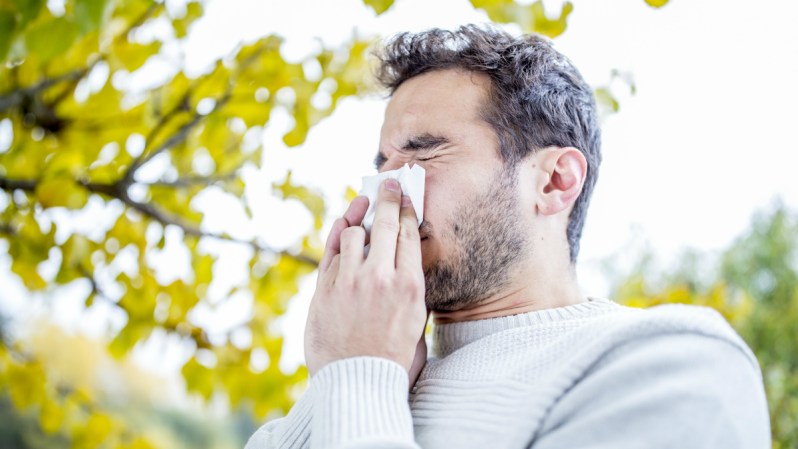
Spring and summer allergies. We hate you. From incurably watery eyes to sneezing, congestion, and even dark circles and puffiness, we’re about done with the billions of tiny pollen that are f-ing up the season.
So we spoke to allergy experts around the country to get their tips on how to get rid of allergies (if you’re already in the throes of pollen purgatory) and ways to prevent symptoms from hitting ahead of time.
Do You Have Allergies or a Cold?
Symptoms include runny nose, itchy and watery eyes, coughing, sneezing, nose and throat itching, and post-nasal drip. How can you discern between a cold/flu and allergies? Cristina Porch-Curren MD, says “A typical cold/flu is the combination of a sore throat and low-grade temperature.” So no temp = it’s allergies. BTW: here’s how to get rid of a cold.
What Is Causing Your Allergies?
“During spring, it tends to be tree pollen and during summer is grass and weed pollen,” says Porch-Curren. “However this all depends on the environment and climate you live in. For example is Southern California we don’t have distinct seasons and pollens can be present year-round.” (But you’ve also got In-n-Out, so weigh the good with the bad, my dudes.)
“Spring and fall can be tricky,” adds Kate Moran, MD. “Dust and pet dander know no season, but plant-based allergens flare up during different times of the year. The Weather Channel “Allergy Tracker” (enter zip code for information on local culprits) can be helpful to predict symptom flare-ups or to prepare for out of town travel.”
How Do You Get Rid of Allergies?
In the midst of symptoms that make you want to man-cry, turn to “nasal saline lavage, various OTC medications like antihistamines and nasal steroid sprays, and make a visit to see your allergist,” says Porch-Curren.
Dr. Moran recommends the following pills, sprays, rinses, and various potions:
“For oral meds, try Zyrtec (cetirizine), Claritin Allegra
She adds that most allergy medications have combination pills with pseudoephedrine, which help with “severe symptoms.” These will be behind the counter and require a photo ID to purchase. “Thank the people who make meth for that inconvenience,” Moran adds. “And do not expect total symptom resolution with only one or two doses. Two thumbs up for generic
Note that anyone with a significant medical history taking prescription medications should discuss over the counter medications with their doctor for safety.
For nasal sprays, look for Nasonex (Mometasone), Flonase Nasacort
You can also turn to a nasal saline rinse. “Use at least 200mL/7ounces per side, one to two times a day,” says Dr. Moran. “Pre-made packets are available or make your own with a one-quart clean, glass jar, distilled or boiled water, 1 teaspoon baking soda, 1 teaspoon salt (pickling or canning salt; NOT table salt – it has other chemical ingredients), mix well, store to use for one week at a time then pitch and start fresh. You’ll need a Neti-Pot
How Do You Prevent Allergy Symptoms From Starting?
You can prevent allergies by using HEPA filters, taking frequent showers, keeping windows closed, not drying clothes outside on a clothesline, and by using a nasal saline spray, Porch-Curren decrees. Keep in mind, a lot of whether you get allergies or not relies on your genetics and exposure. Which means, avoid the triggers you know make your eyes red as the devil. Use your air conditioning and keep windows and doors closed.


